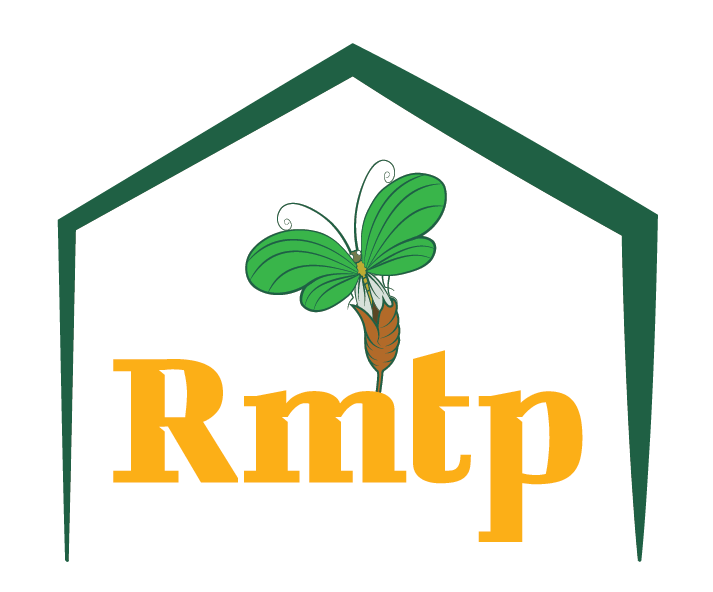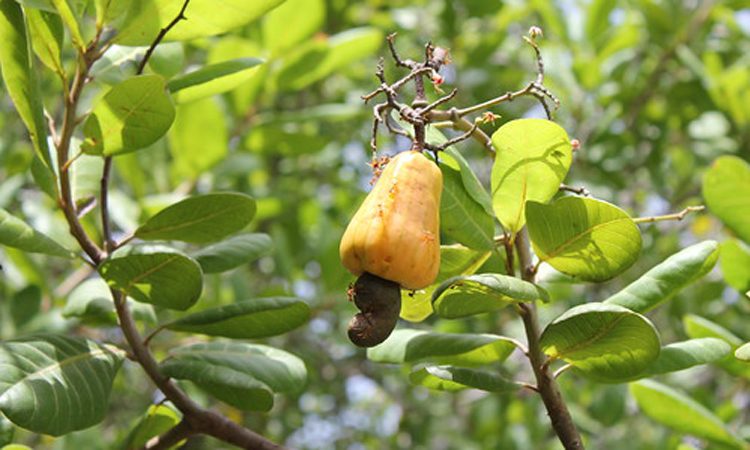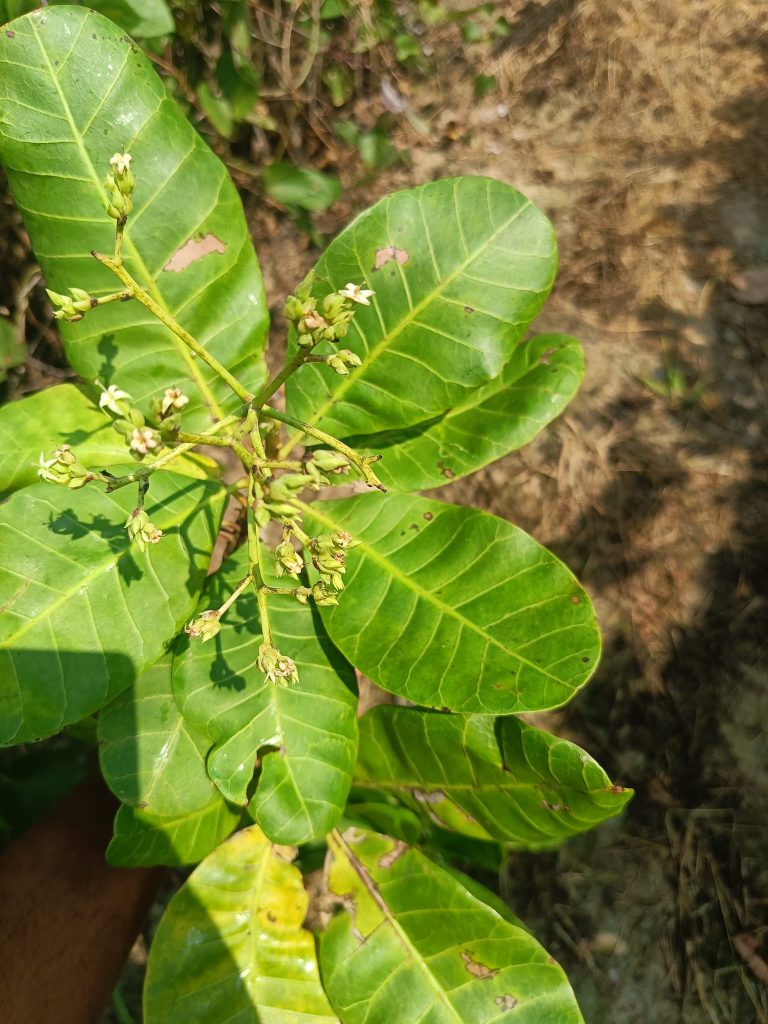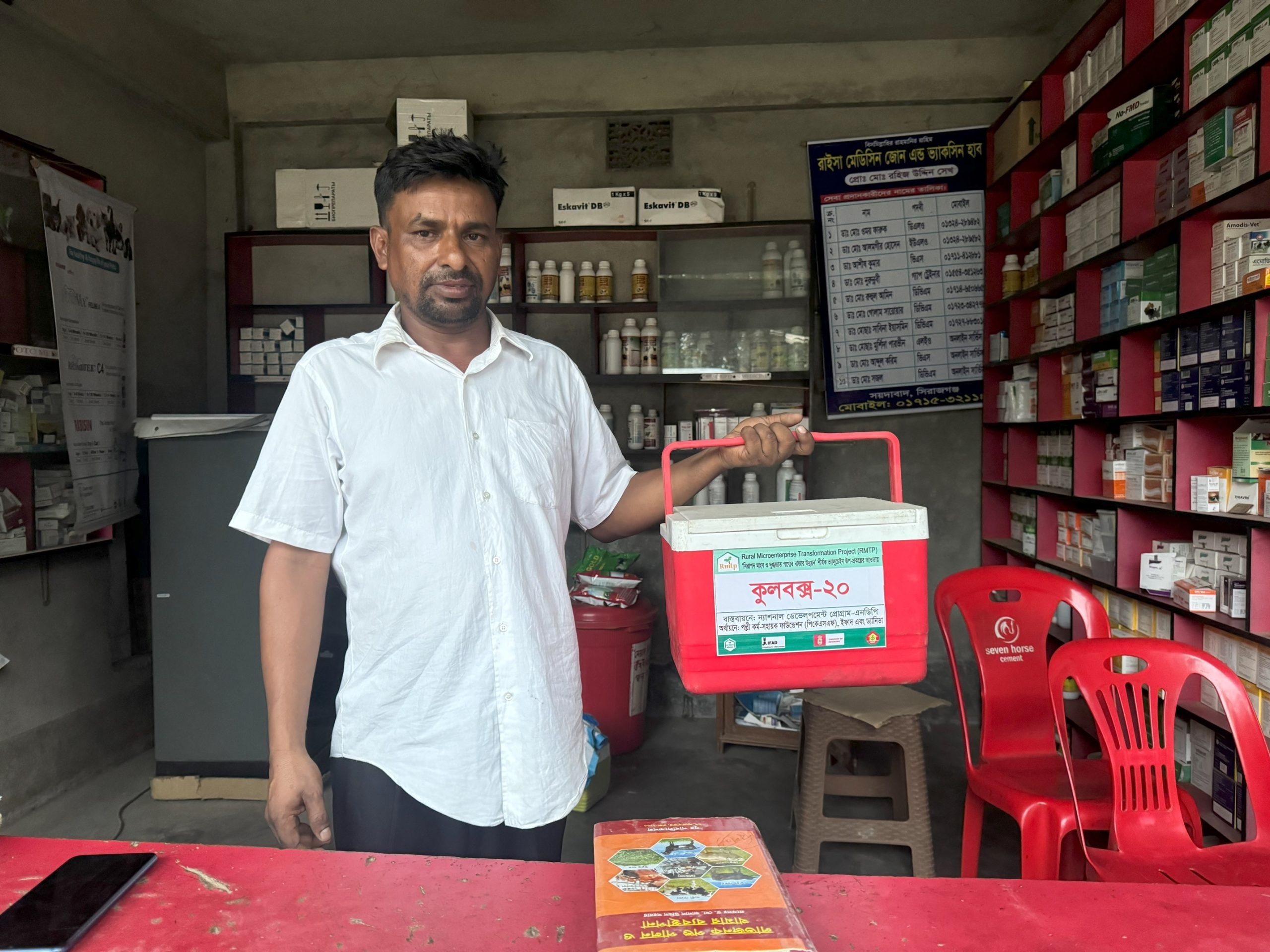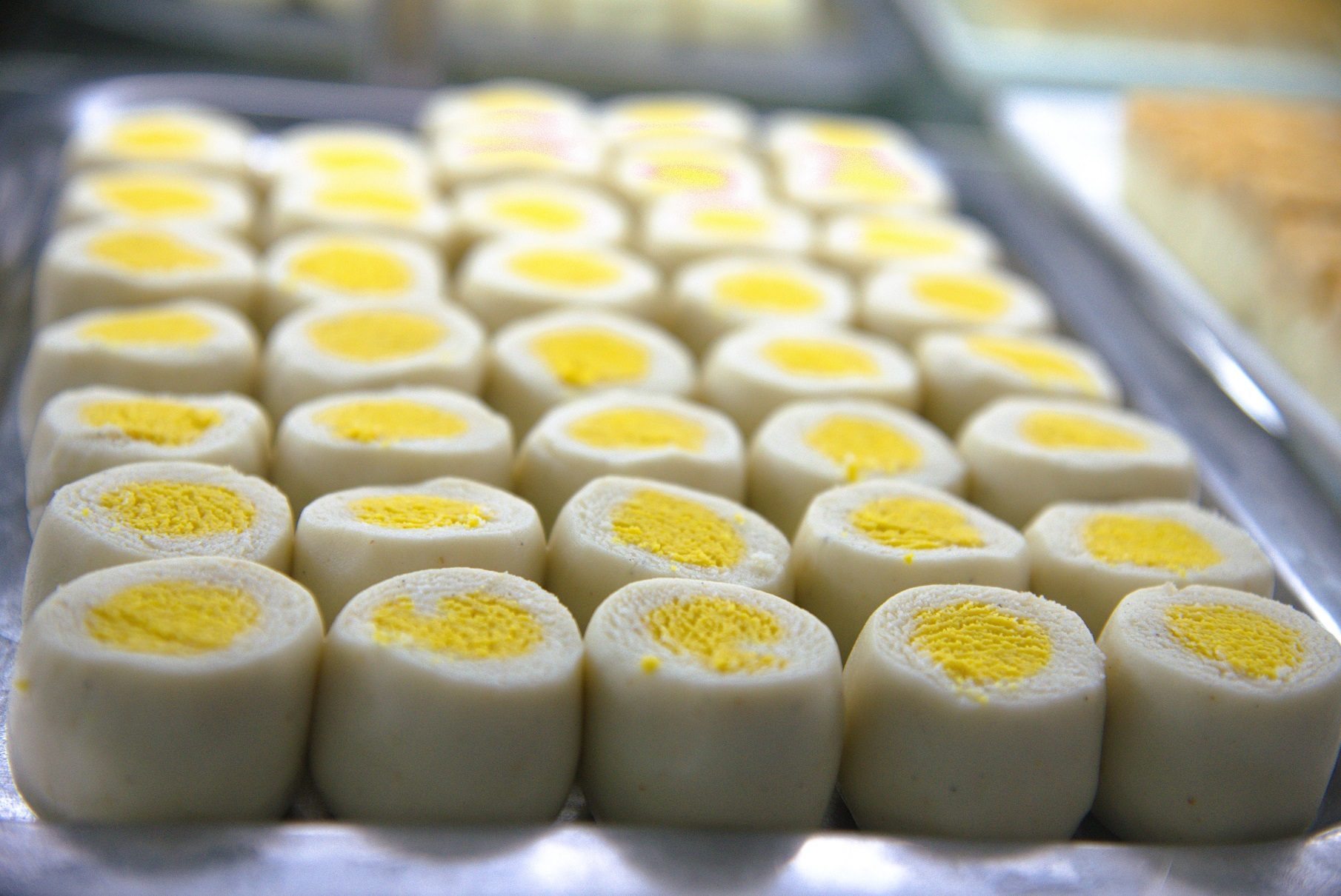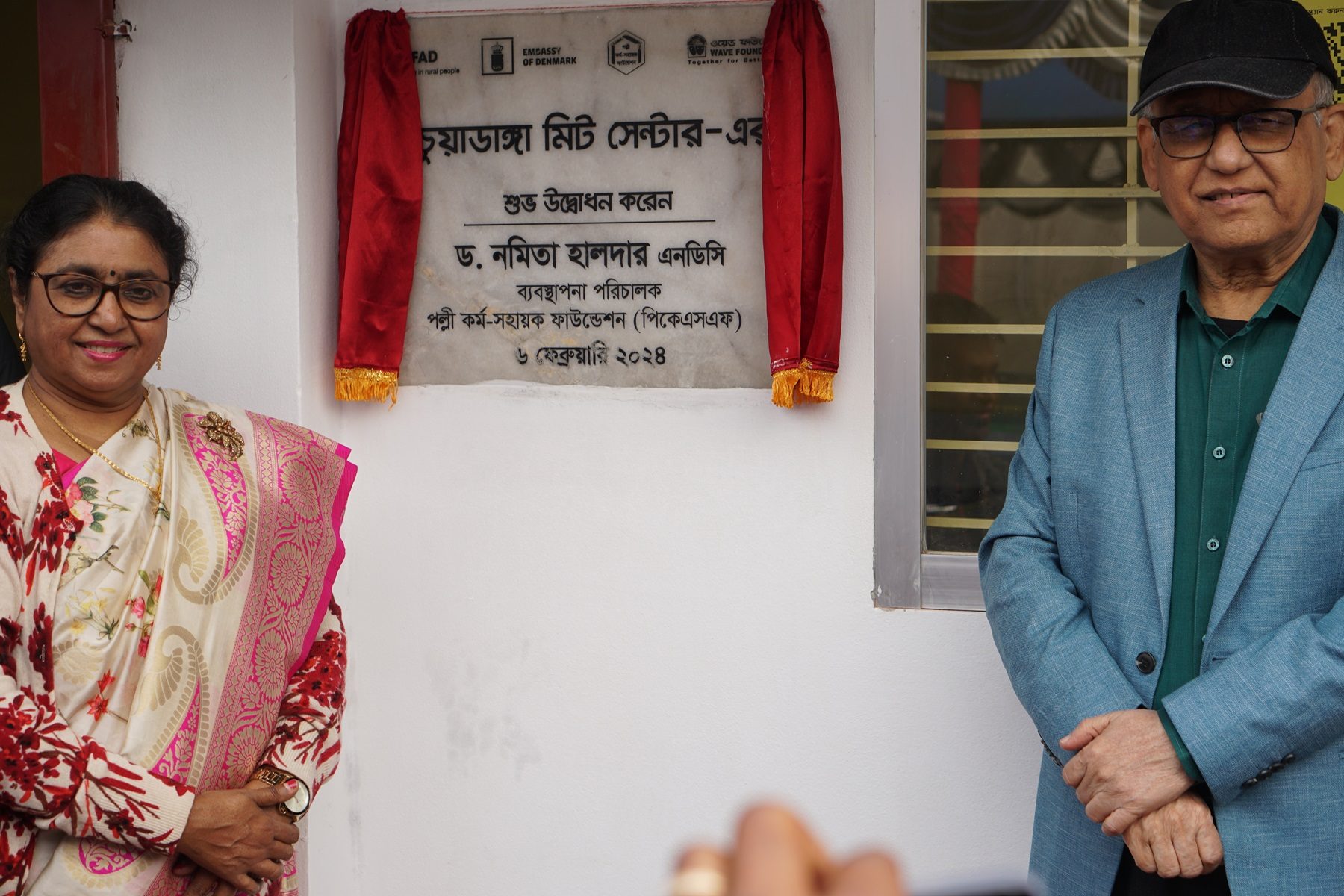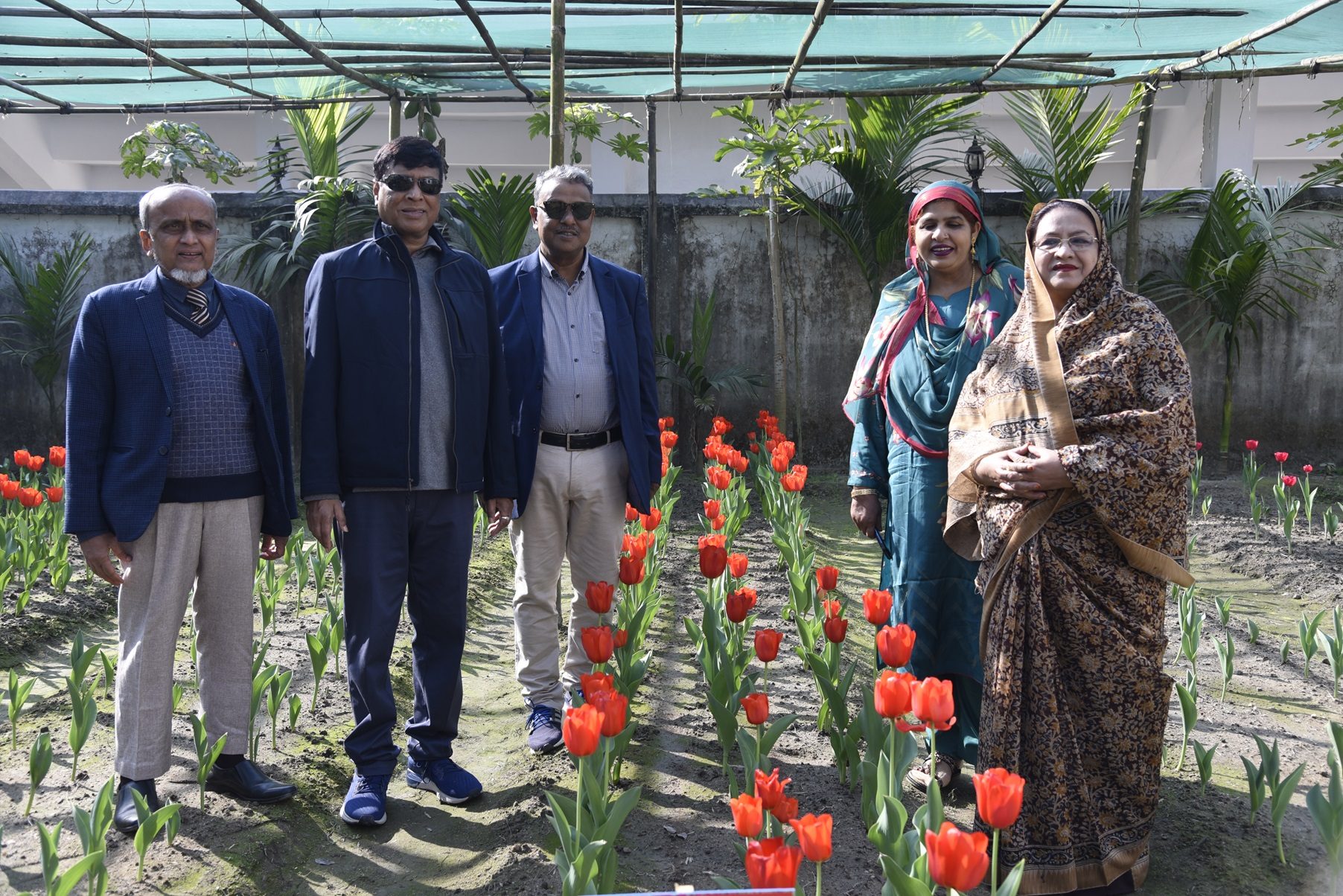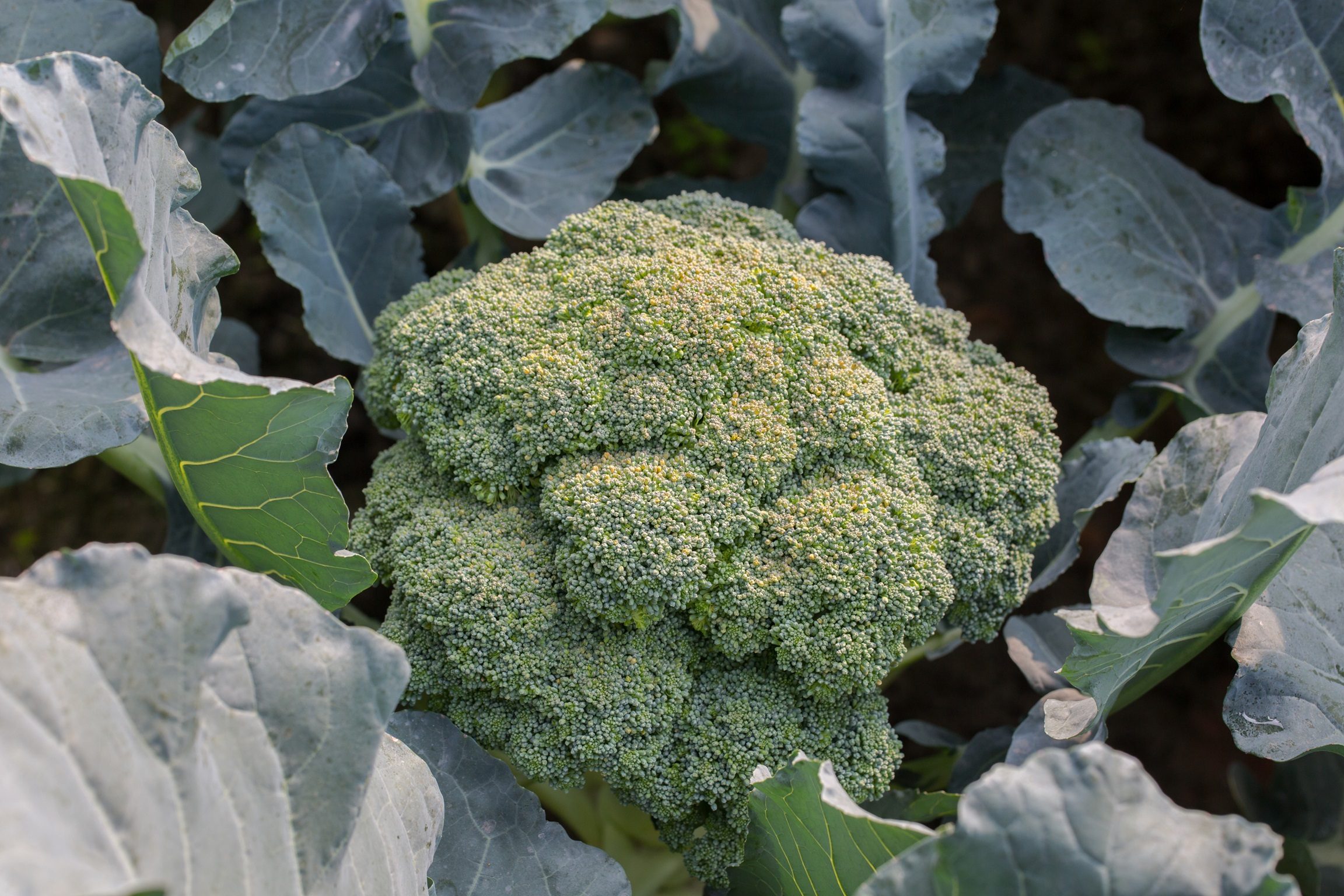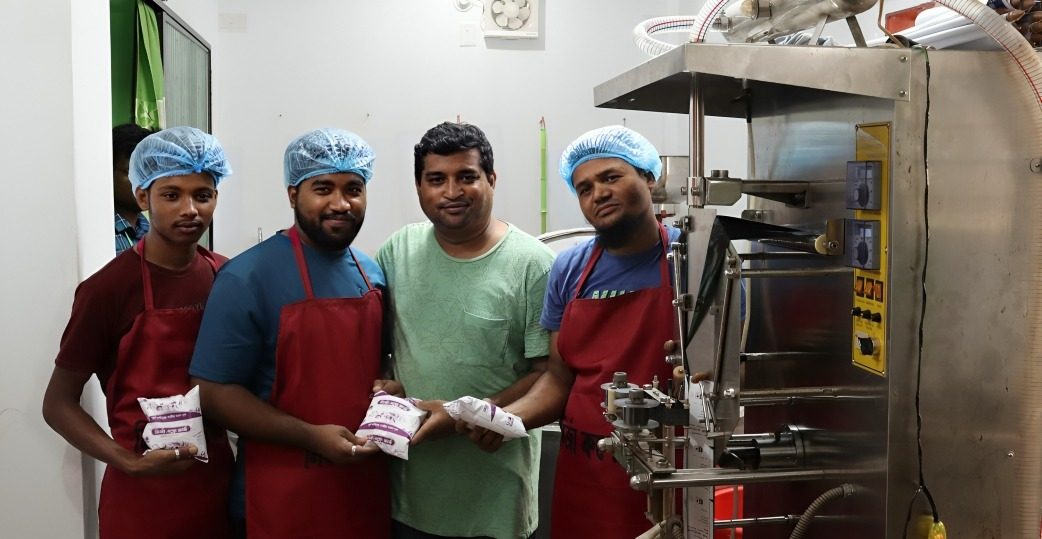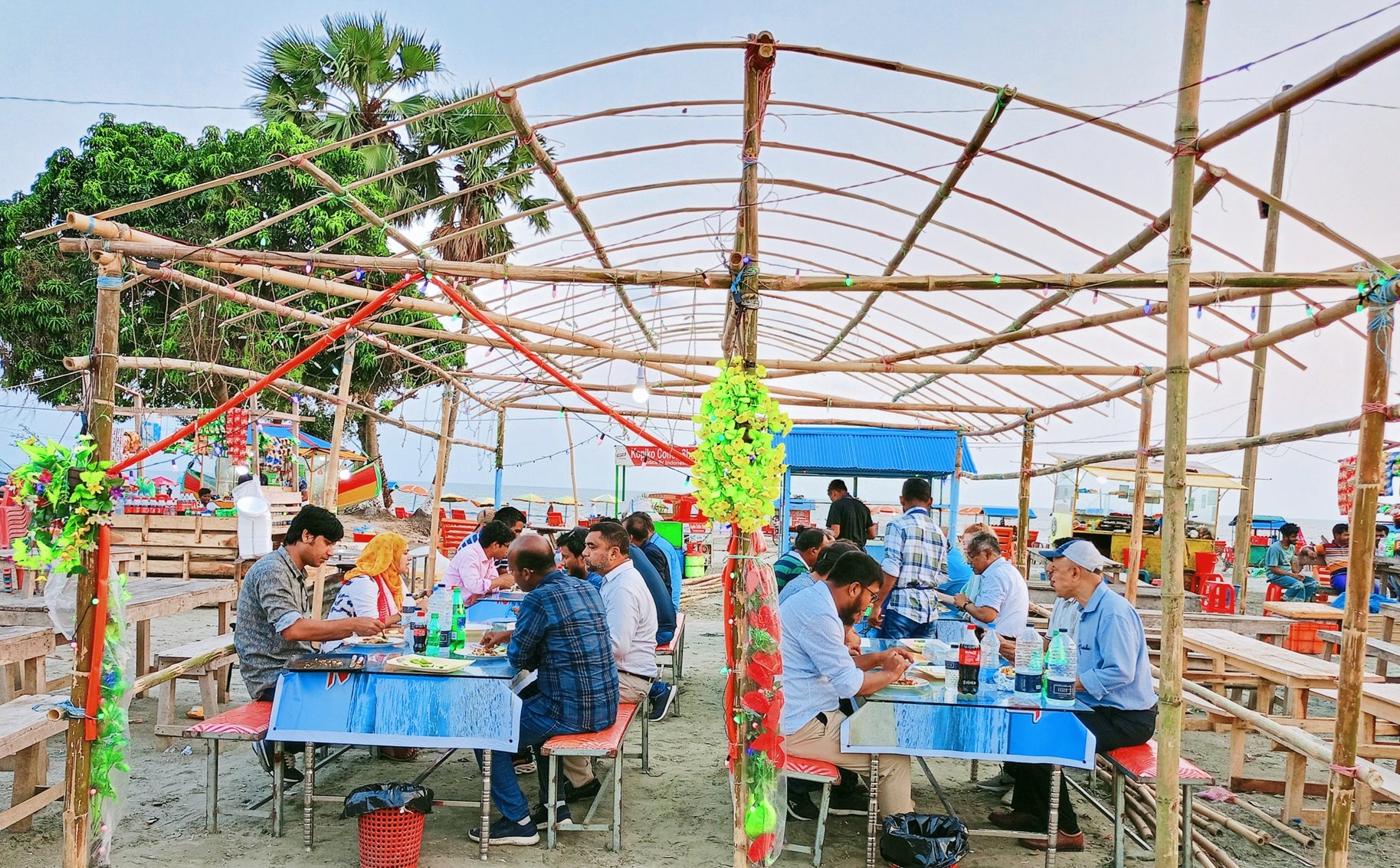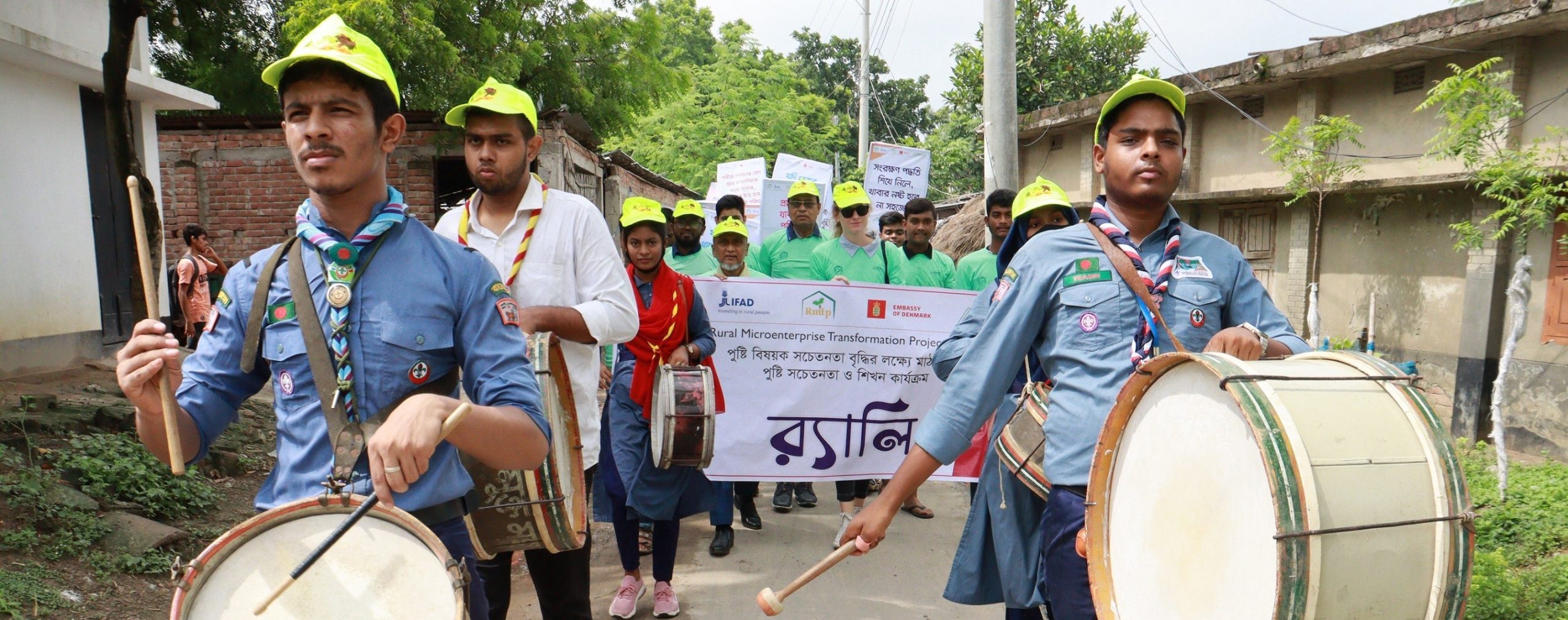Tag: Nutrition
Establishing vaccine hubs in the grassroots
The livestock sector continues to face significant challenges, with high mortality and morbidity rates among cattle being particularly concerning. To address this issue, RMTP has established 175 vaccine hubs across 36 upazilas in 12 districts. This initiative aims to provide regular, high-quality vaccination services to approximately 650,000 livestock, including cows, buffaloes, goats, and sheep, benefiting 200,000 farmers annually. Furthermore, efforts to combat vaccine hesitancy include training around 2,000 skilled vaccinators and educating 200,000 farmers through comprehensive training programs.
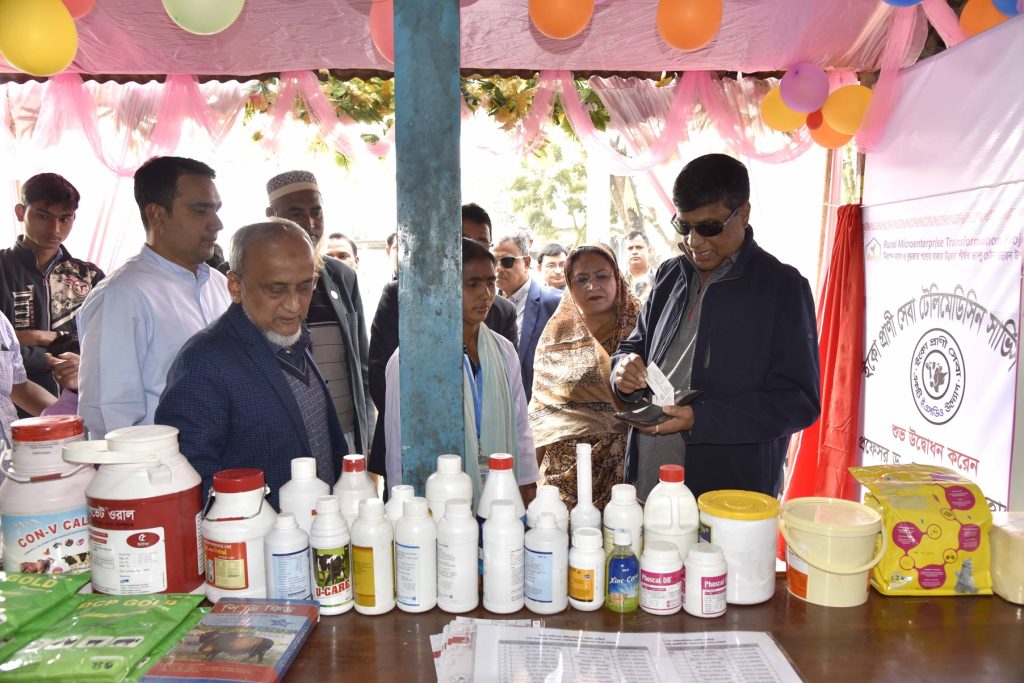
Diversified milk products to fulfil demands of consumers
Bangladesh’s dairy industry is meeting the growing demand for milk products by diversifying products. To meet an ever-increasing demand and reduce import dependency, RMTP has introduced various initiatives to produce a wide range of high-quality milk-based products. These include sweets, curd, ghee, cheese, butter, and buttermilk. These products are now easily accessible online and offline, offering better customer experiences. For details, please click on the link https://www.tbsnews.net/economy/industry/mozzarella-cheese-women-thakurgaon-who-work-wonders-805490
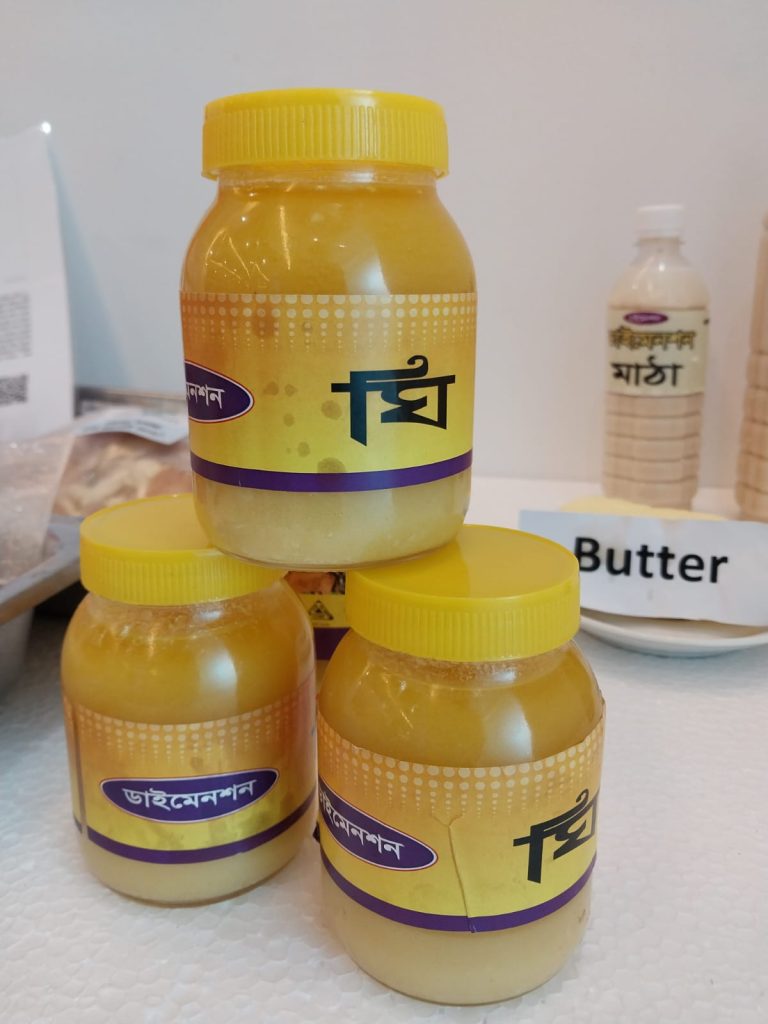
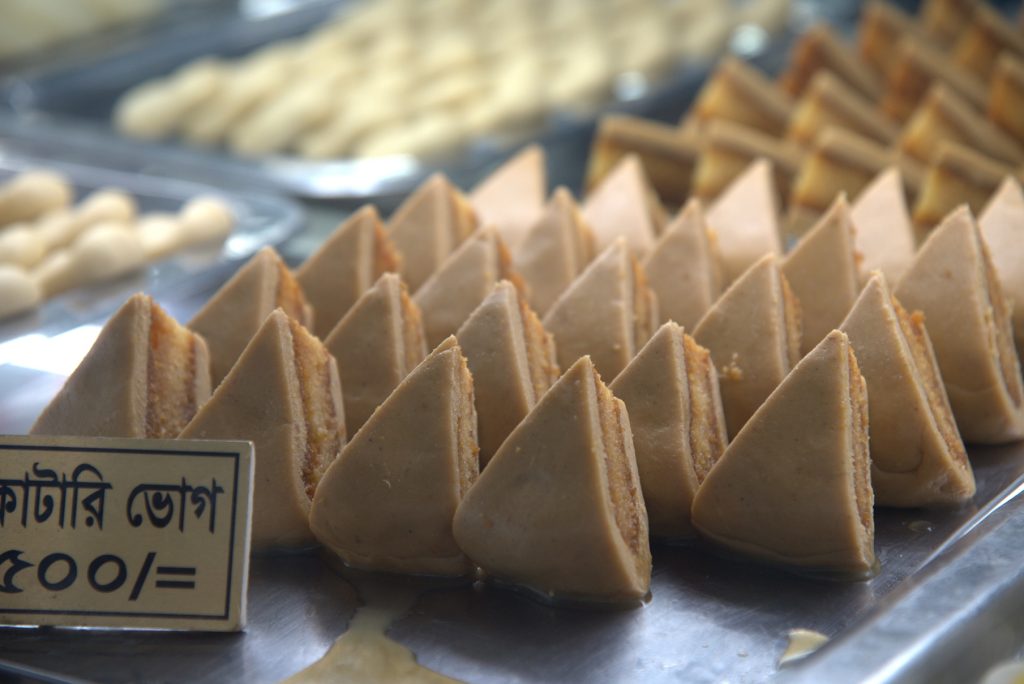
Managing Director of PKSF Inaugurates ‘Chuadanga Meat’ Enterprise of RMTP
Dr Nomita Halder ndc, Managing Director of PKSF, inaugurated ‘Chuadanga Meat Center’ established by WAVE Foundation, a Partner Organization PKSF, in Alamdanga Upazila of Chuadanga district under RMTP on 6 February 2024. Dr Halder conveyed her sincere appreciation to all for initiating this innovative endeavour. The inaugural ceremony was also attended by Dr Mostafizur Rahman, Upazila Livestock Officer, and Mohsin Ali, Executive Director of Wave Foundation.
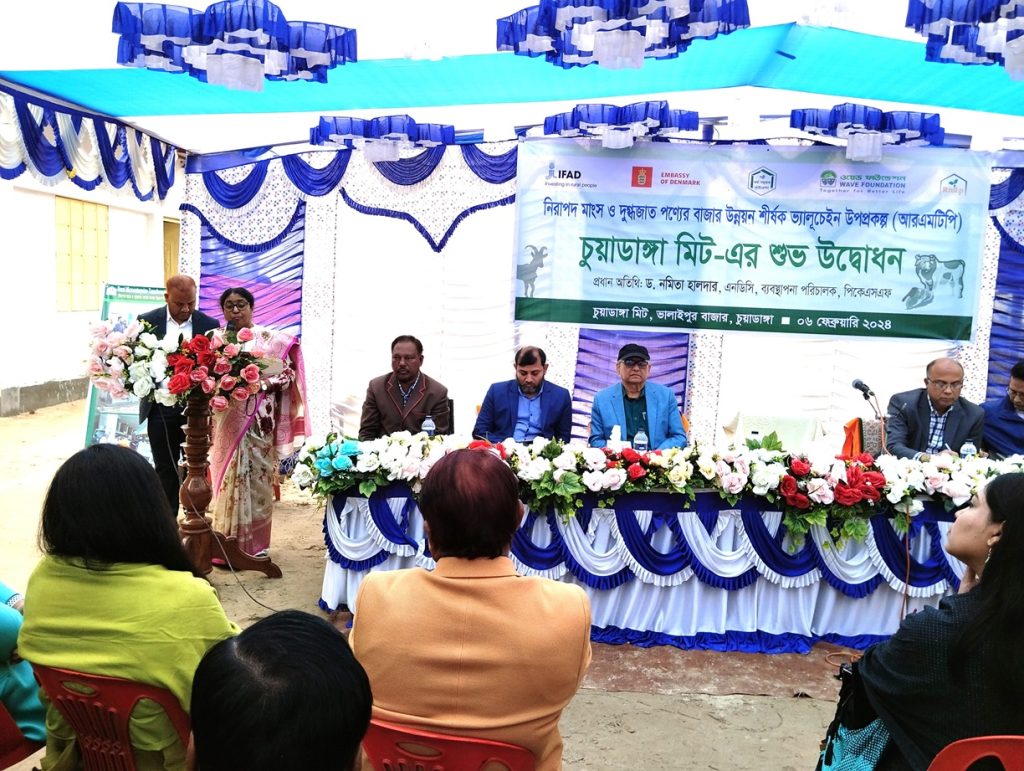
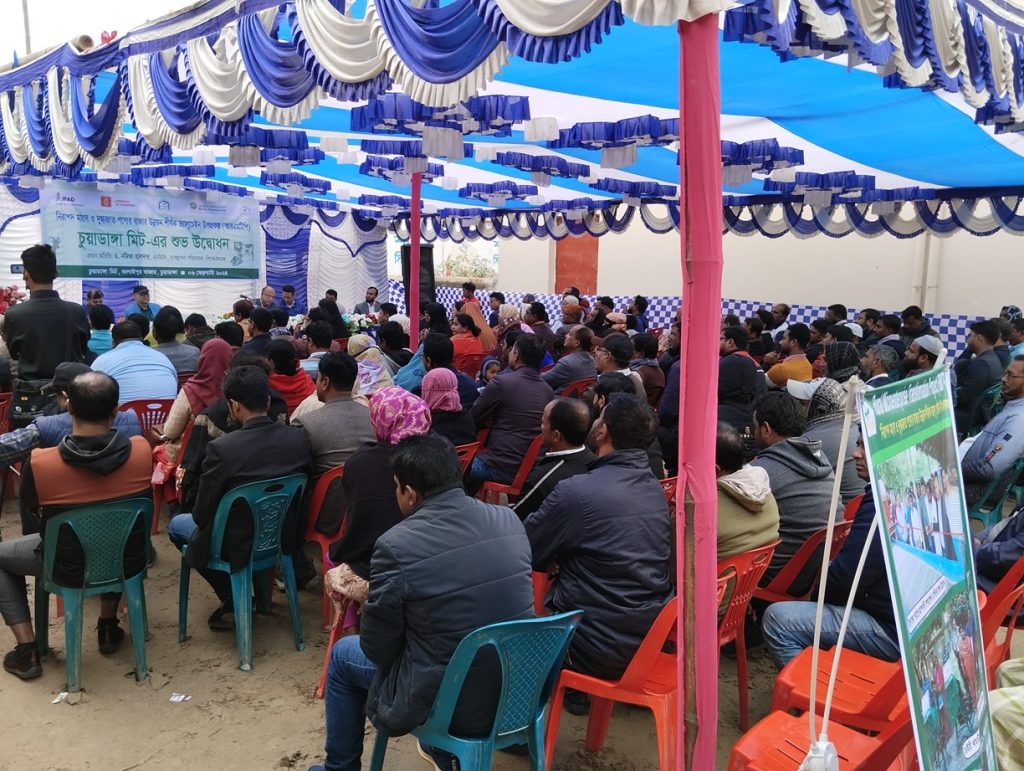
In acknowledgment of the entrepreneurial risk inherent in this initiative, Dr. Halder extended a warm welcome to Mr. Jillur Rahman. She expressed her optimistic anticipation for the widespread acceptance of ‘Chuadanga Meat’ among the general populace. The inaugural ceremony was also graced by the presence of Dr. Mostafizur Rahman, Upazila Livestock Officer, and Mr. Mohsin Ali, Executive Director of Wave Foundation. This significant event marks a pivotal milestone in the collaborative efforts aimed at fostering sustainable economic development and promoting the welfare of communities within the region.
PKSF Chairman visits field activities in Panchagarh and Thakurgaon
PKSF Chairman Dr M. Khairul Hossain visited various programs being implemented through ESDO, a Partner Organization (PO) of PKSF in Panchagarh and Thakurgaon districts from 12-14 February 2024.
At the beginning of the tour, he visited the tulip cultivation program in Tetulia. There he exchanged views with the farmers. They discussed the production process, market potential and future action plans.
On the second day, Dr Khairul Hossain visited a tea garden and tea factories in Panchagarh. Then, he placed a wreath at Aparajeo 71 in Thakurgaon and paid tribute to the martyrs of the Liberation War. Later, he visited a cheese factory, telemedicine centre and safe vegetable cultivation program under the RMTP project, implemented through ESDO.
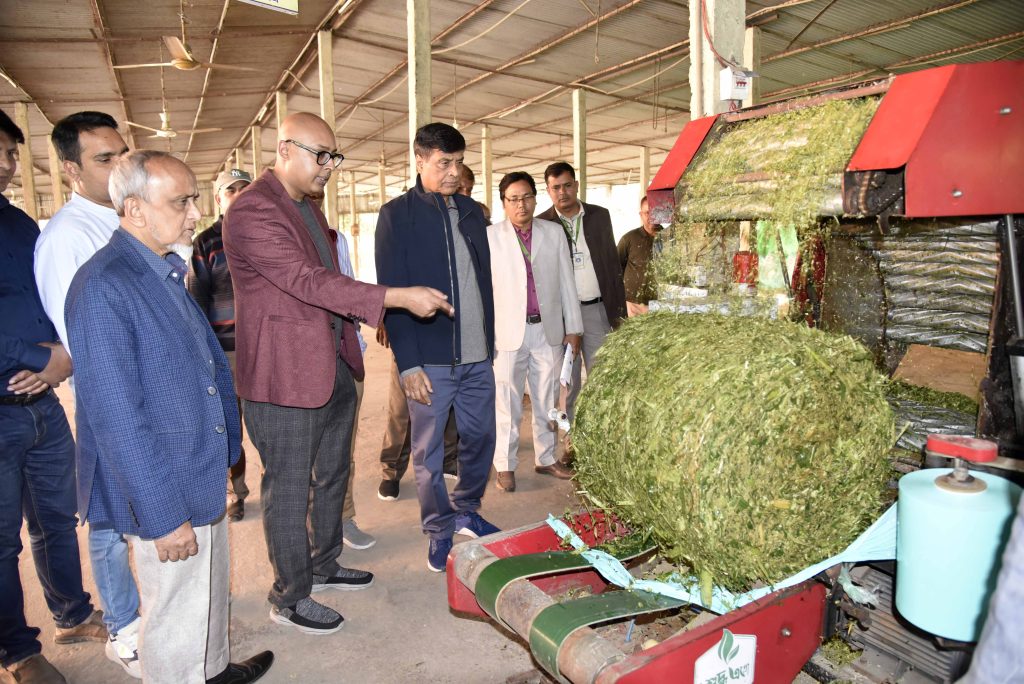
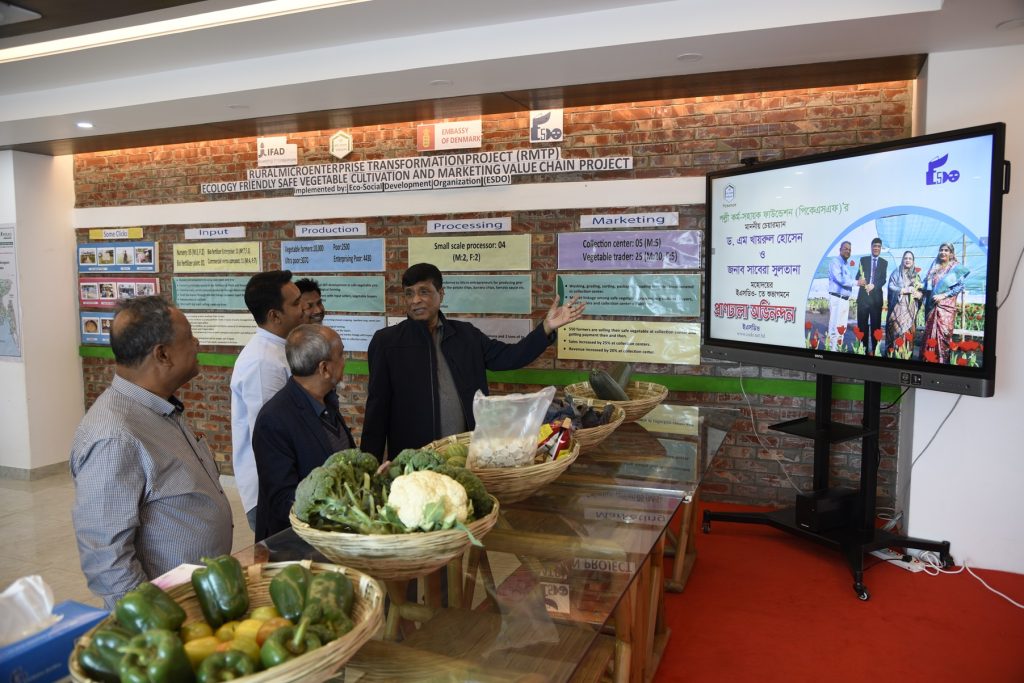
Appreciating RMTP’s value chain activities, Dr Khairul Hossain said “Farmers here are getting good prices by producing and marketing safe vegetables through the project, which impressed me”.
The same day, he participated in a meeting at the ESDO office. In the meeting, he handed over the ISO certificates to seven entrepreneurs of RMTP and unveiled the ECO Animal Service Card. Then he joined a civic reception program followed by a cultural event.
PKSF Chairman, on 14 February, visited a folk museum established by ESDO. During the visit, PKSF’s Senior General Manager (Program) and Project Coordinator of the RMTP Dr Akond Md. Rafiqul Islam and ESDO’s Executive Director Dr Md Shahid Uz Zaman accompanied PKSF Chairman.
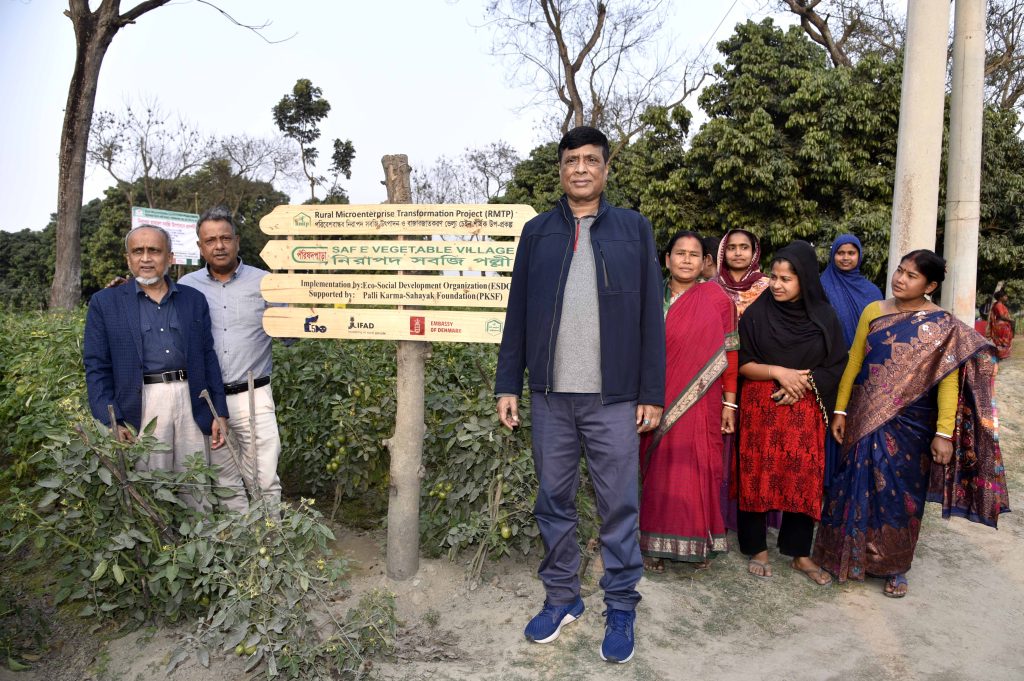
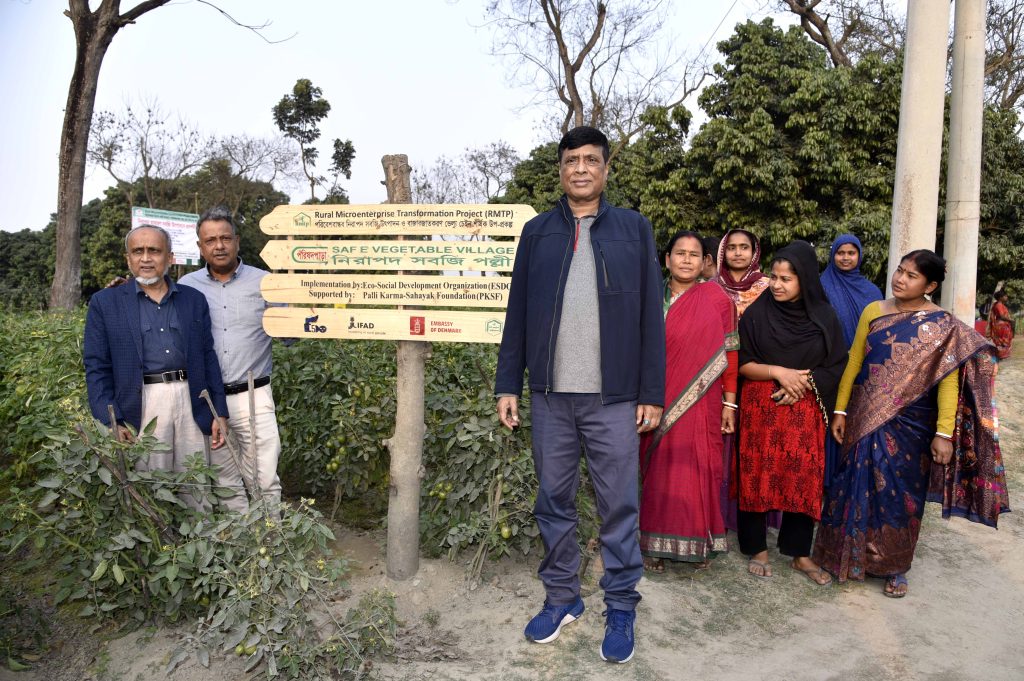
Belal Makes Double Profit to Cultivate High-Yield Vegetable
Belal Hossain, a 40-year-old farmer from the Punchbibi sub-district of Joypurhat, has been cultivating vegetables, paddy, and other crops on his lands for a long time, but he found it to be not very profitable. To support his family’s needs, he had to take lease lands from others. However, the income he generated was barely enough to manage his two daughters’ education costs. Feeling frustrated, Belal started seeking new techniques and methods of cultivation.
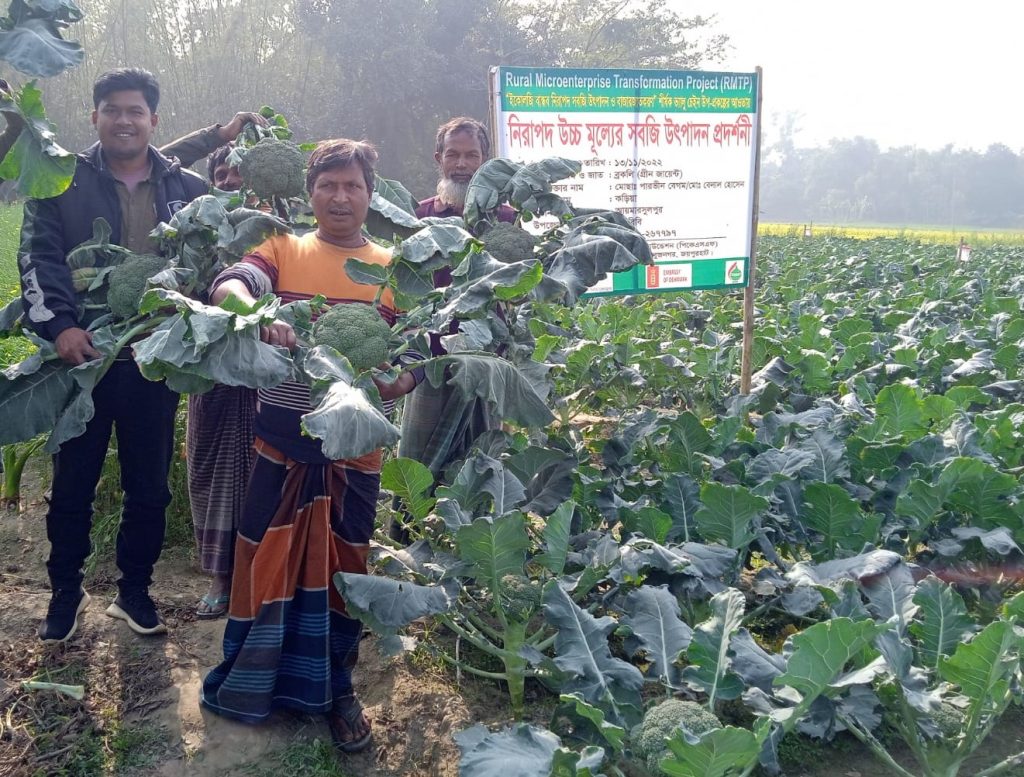
Fortunately, Belal has been a member of the microcredit group of PKSF’s Partner Organization, JAKAS Foundation for the last eight years. He was selected as a project participant for the “Eco-friendly vegetable cultivation and marketing” sub-project, which is being implemented by JAKAS and supported by PKSF, IFAD, and DANIDA under the Rural Microenterprise Transformation Project (RMTP).
As part of the sub-project, Belal received training on eco-friendly vegetable cultivation, nutrition, environment, and social issues. He tested the soil quality and sowed 1600 broccoli seedlings in 16 decimals of land. Additionally, he cultivated master oil seeds around the broccoli cultivated area. Within 25-60 days, he harvested broccoli and sold each piece for BDT 30 to local traders. He earned BDT 48,000 by selling broccoli and another 1500 taka from the master oil seeds.
Project intervention of RMTP
Profitability of 22 demos of RMTP
- Training on eco-friendly vegetable cultivation
- Market linkage
- Demo plot established
- Pesticide residual test support
- Land usages for vegetable cultivation 276 decimals
- Production cost total 234,075 BDT
- Produced 31,411 kilograms of vegetables
- Total sales reached 527,450 BDT
Following the success of this year’s cultivation, Belal is planning to cultivate broccoli in 50 decimals of land next year. He is currently cultivating other vegetables on the said land, following the guidelines of eco-friendly vegetable cultivation. With his new techniques and knowledge, Belal has made double the profit and is now able to support his family’s needs better.
Commercial Production of Packaged Milk Begins in Barishal
Mirza Ifte Khairul Hossain is a prosperous dairy entrepreneur who initiated his business on January 1, 2020, by producing 5 kg of milk on his own farm. Initially, he sold milk in plastic bottles to various grocery stores. However, due to poor packaging quality, and lack of marketing techniques, he experienced insufficient client response. In 2022, Mirza Ifte Khairul Hossain was selected as a participant in the Rural Microenterprise Transformation Project (RMTP) of PKSF. Then he received training under the RMTP on the production, packaging, marketing and branding of safe milk products. He also received a grant from the project to establish a modern chilling plant and packaging machine. Subsequently, the RMTP project made a linkage with contract farmers to increase the production of packaged milk.
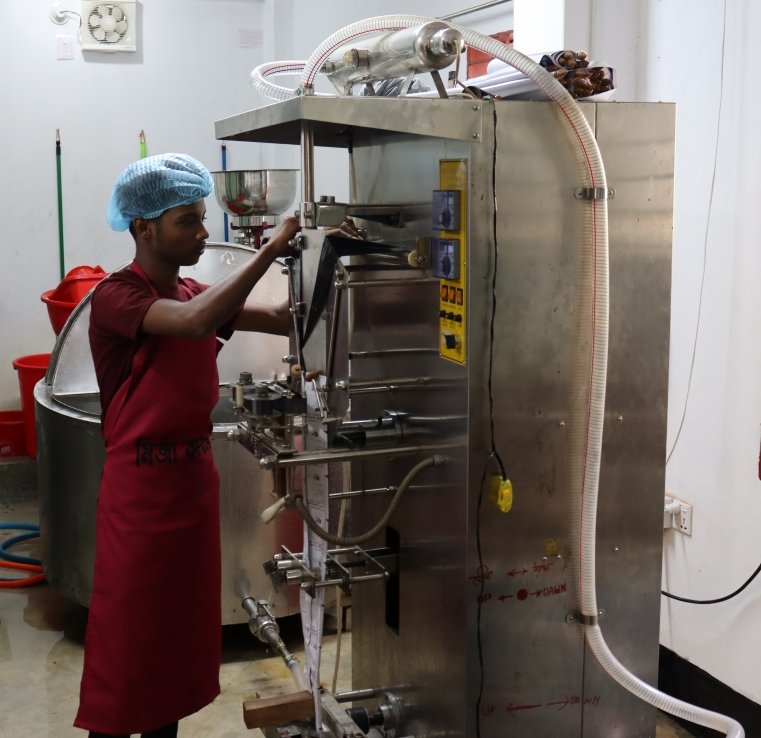
Mirza Ifte Khairul has successfully transitioned his business to selling packaged milk by leveraging modern chilling plants and milk packaging machines. In addition, he has developed his own company ‘Mirza Corporation’. In Barishal city, his company now manufactures and sells 450 liters of packaged milk every day, with 150 liters from his own farm and the rest 300 liters from 35 contracted farms.
Besides, he uses ICT technology to keep updated business records and digital payment methods. He has also secured a BSTI license, a trade license from the City Corporation of Barishal, and a health and hygiene license from the Civil Surgeon’s office to ensure the smooth operation of his business.
At present, Mirza Ifte earns BDT 1,08,000 per month by selling milk. He dreams of establishing the ‘Mirza Agro Farm’ brand and selling milk throughout the country. He has also planned to produce ghee, sweets, and curd in his product line.
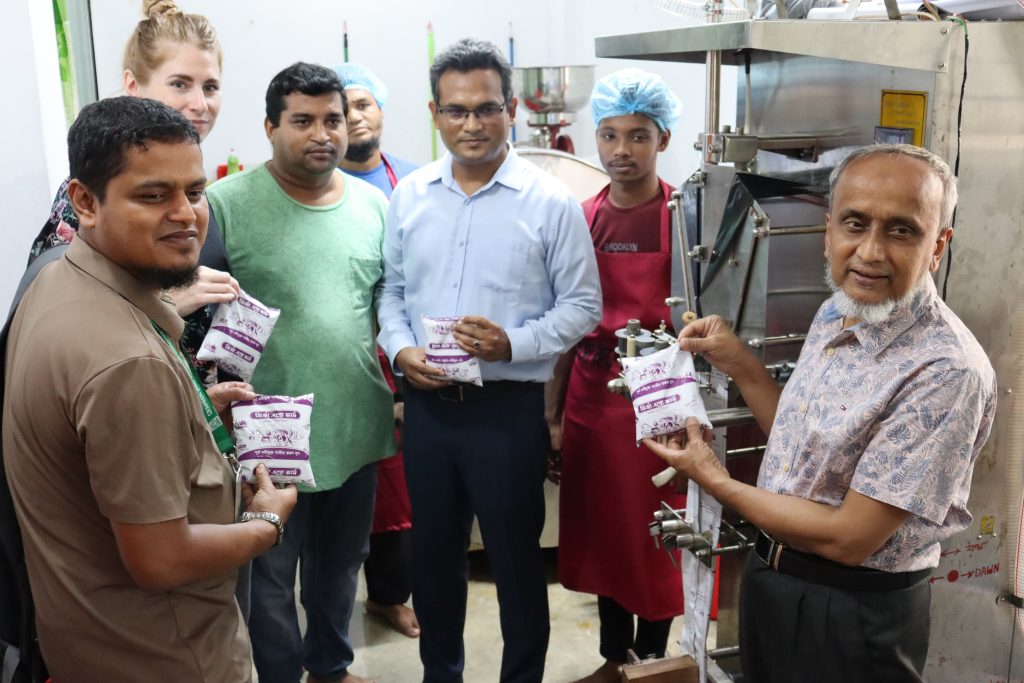
Kawsar’s Remarkable Journey of Transformation
Kawsar, a 32-year-old, grew up in a disadvantaged family as the youngest of four siblings. His journey began with selling vegetables alongside his father during his childhood. In 2008, he launched a mobile shop specializing in crab sales on Kuakata Beach, using 400 takas as capital. During this time, he successfully generated a daily income of 600 taka by selling 2 kg of crab fry. In 2010 he expanded his business by opening a small-scale establishment, offering lobster, crab, hilsa fry, and even a coffee shop. In 2014, recognizing the growing demand for fish and crab fry, he took a step by launching ‘Kaosar Bhai’s Fish Fry,’ restaurant. At the peak of this venture, he was selling approximately 150 kg of fish and 100 kg of crab every month. Mr. Kawsar collected and preserved fish by using traditional methods. He had to decline his customer base due to serving unhealthy food and not maintaining hygiene properly.
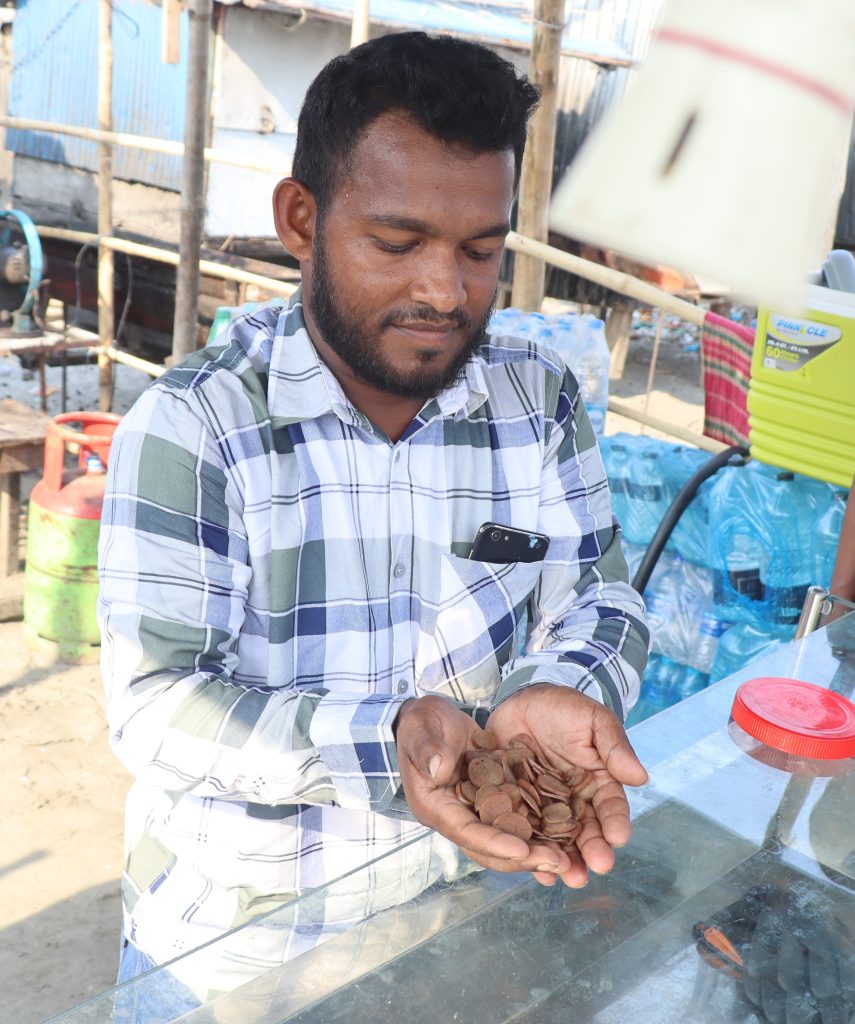
In 2022, he was included as a member of the value chain sub-project titled ‘Production and Marketing of Safe Fishery Products,’ which is implemented by CODEC, a partner organization of PKSF, as part of the Rural Microenterprise Transformation Project (RMTP). The project provided him with training on maintaining hygiene and producing diversified products, such as (fish burgers, fish balls, fish chips etc). Additionally, a modern table fridge is also supported to him. The project supported him with BDT 100,000 (one lakh) grants and extended a loan of BDT 100,000 (one Lakh) to expand his business.
This is the inception of his smart venture. Currently, there are six skilled employees in his company. The customer base gradually increasing because of the skilled employees, who are dedicated to preparing food by maintaining proper hygiene and serving food by using cold-pressed sunflower oil to meet customer demands. Furthermore, he has provided comfortable seating options with tables, chairs, and benches for customers to enhance both the aesthetics of the shop and the longevity of the food, he also utilizes glass enclosures for food display.
Currently, he collected a variety of fish from rivers and seas, including (Vetki, Hilsa, Lobster, Roopchanda, Tuna, Red Coral, Lakshya, Vole Coral, Shurma, Rupsa, Octopus, Squid, Crab, Red and White Sniper, Salmon etc), he prepares these fish by frying or barbecuing them, and then sells and delivers them to hotels. In addition to direct sales, he also sells various types of river and sea fish prepared as fried and barbecued dishes through platforms like Facebook, IMO, and mobile calls. Every month, he sells approximately 750 kg of fish and 300 kg of crab, with a total of around BDT 60,000 (six lakhs). Excluding all expenses, his net profit amounts to 2 lakh takas.
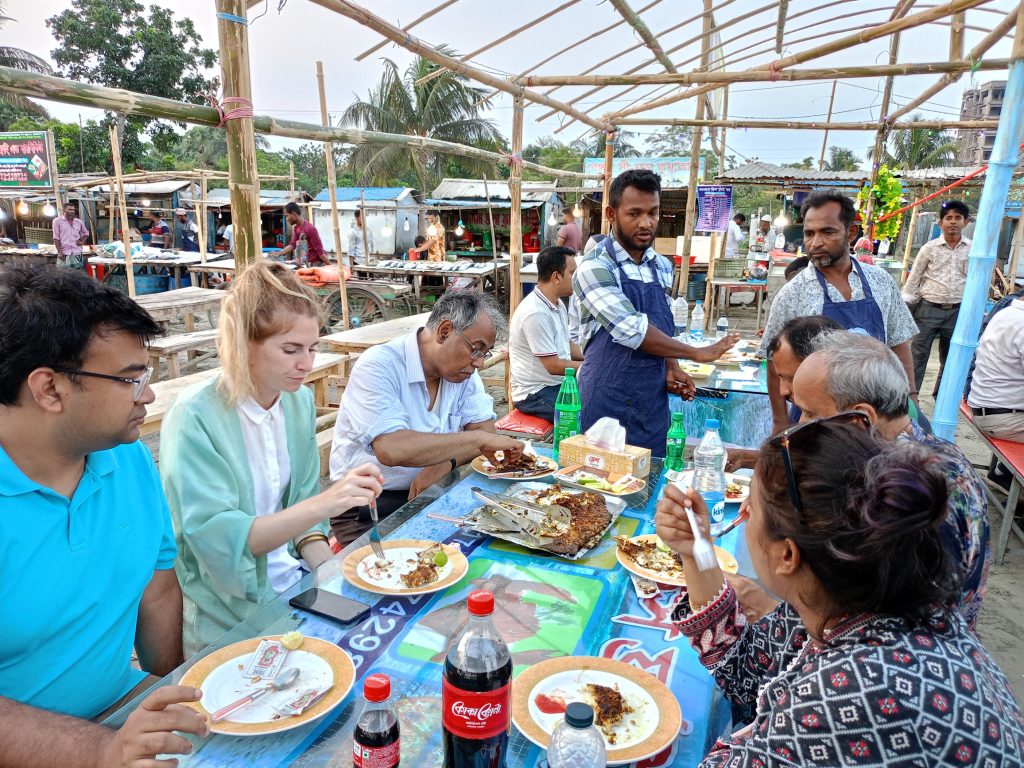
Kawsar’s dream is to create a brand known as “Kawsar Bhai’s Fish Fry Ghar,” with a mission to provide consumers with safe, ready-to-eat fish products delivered directly to their homes. By seeing the success of Mr. Kawser, several fish fry shops hygienically serve food along with lucrative decoration. Local government officials and local administrations lauded Mr Kawsar’s innovative initiative and urged everyone to promote his novel concept at Kuakata Beach.
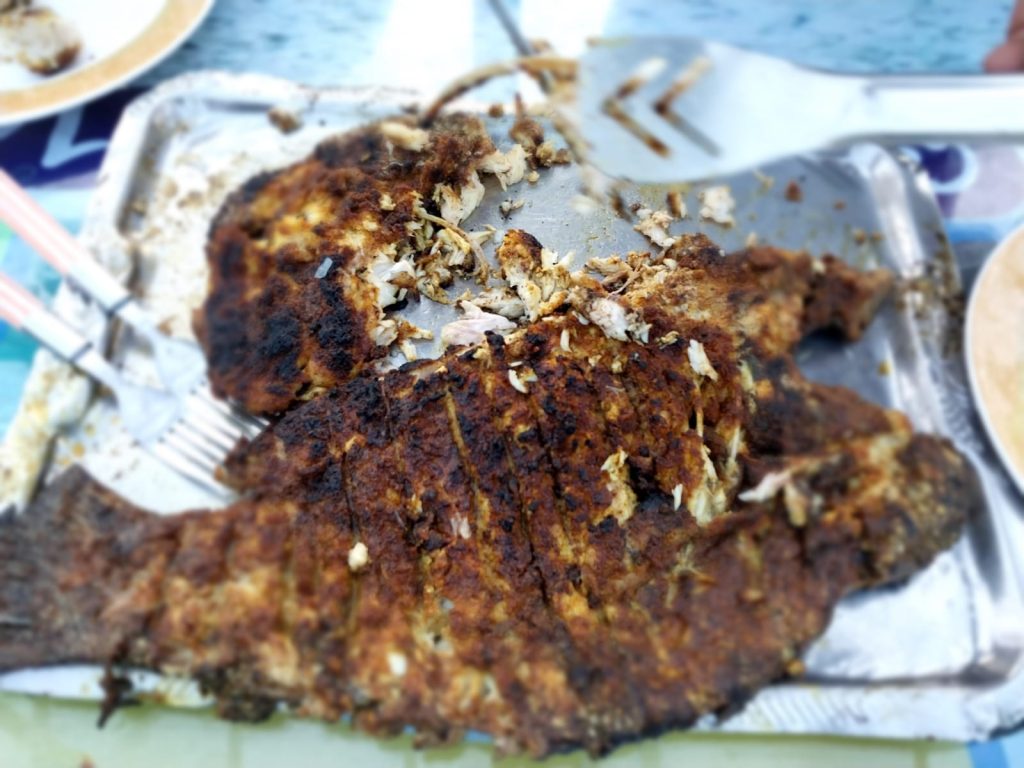
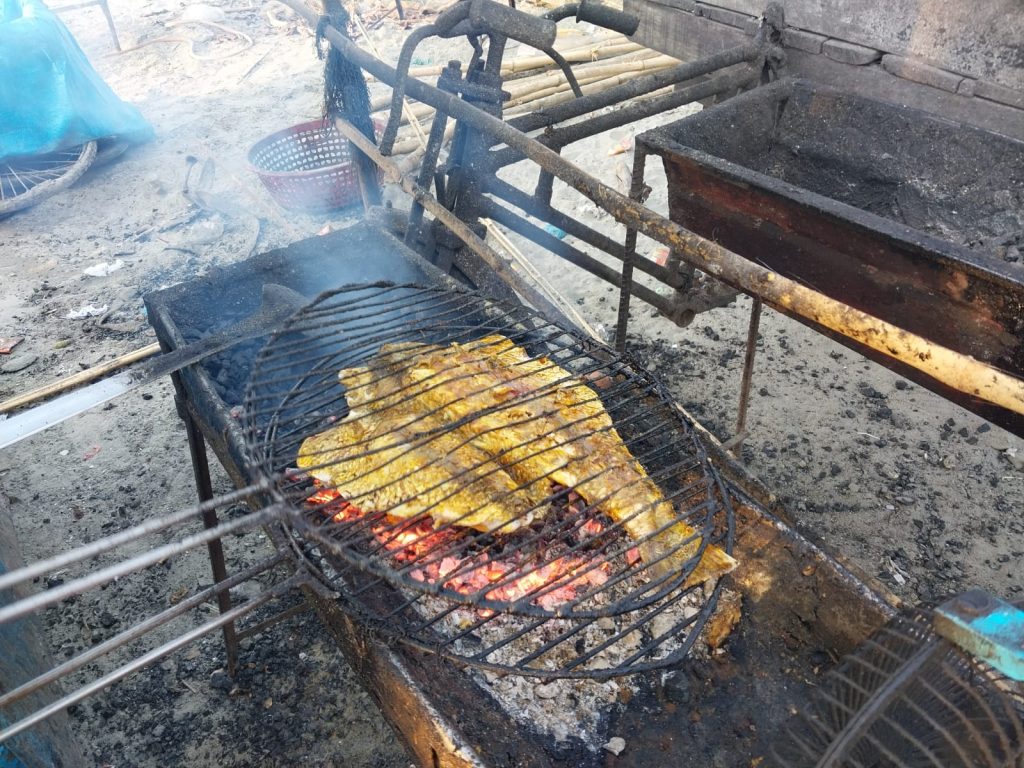

Nutrition Campaign to Empower and Educate Citizens
On September 7, 2023, the Rural Microenterprise Transformation Project (RMTP) organized a nutrition campaign in collaboration with the partner organization, Proyas Manobik Unnayan Society, in Chapainawabganj.
The campaign was designed to engage the community through a set of diverse activities, including live food demonstrations, a rally, Gombhira songs, drama, open discussions, and a quiz competition. Approximately 600 people, including students and youths, participated in the campaign.
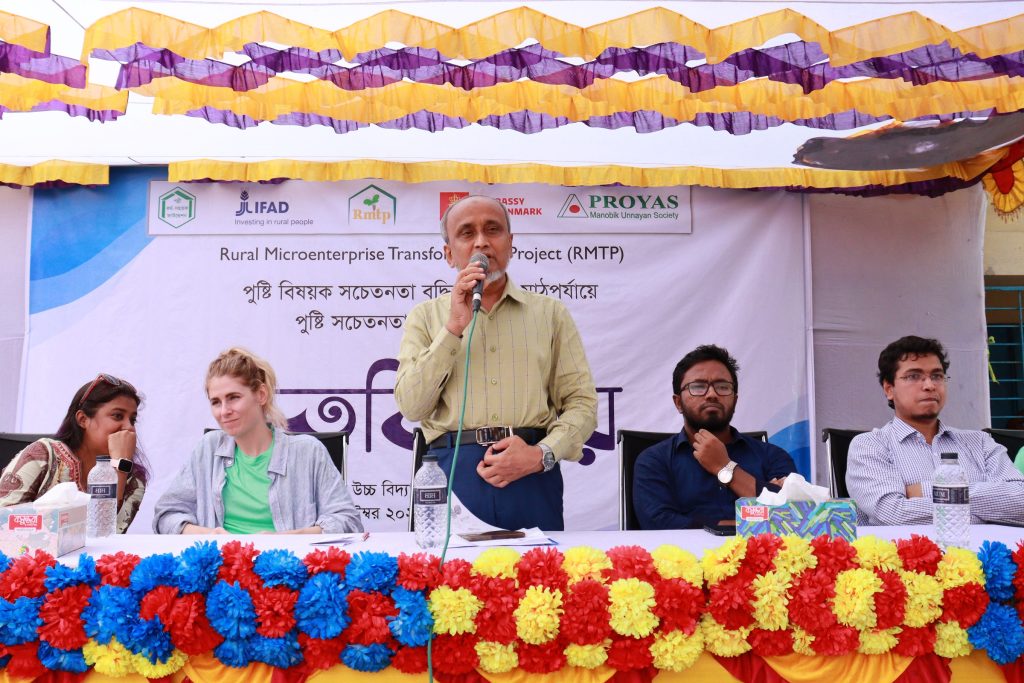
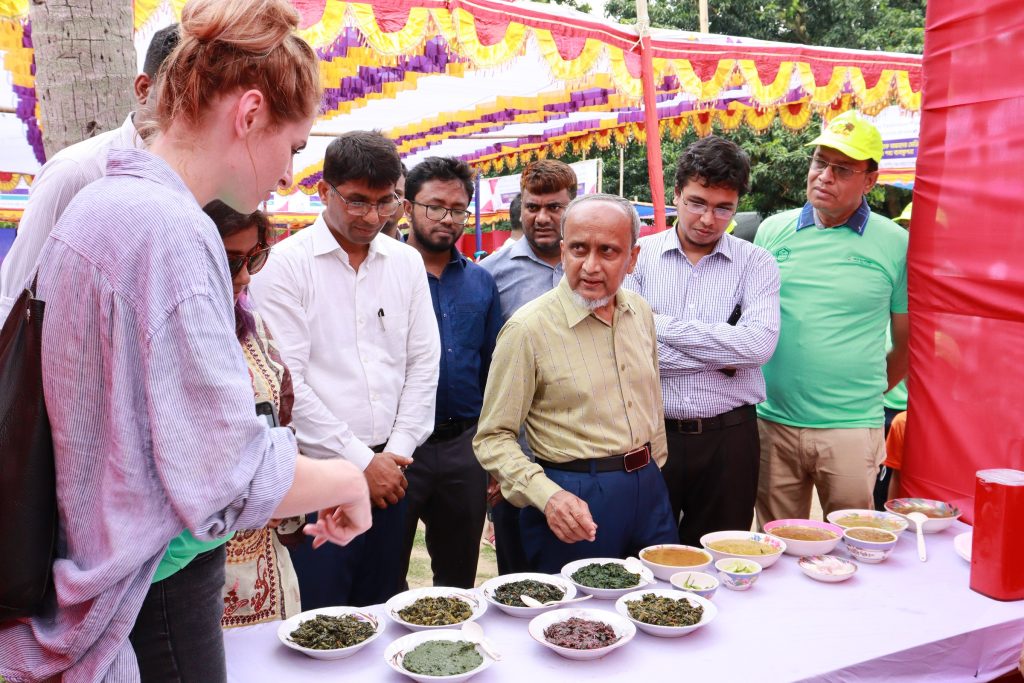
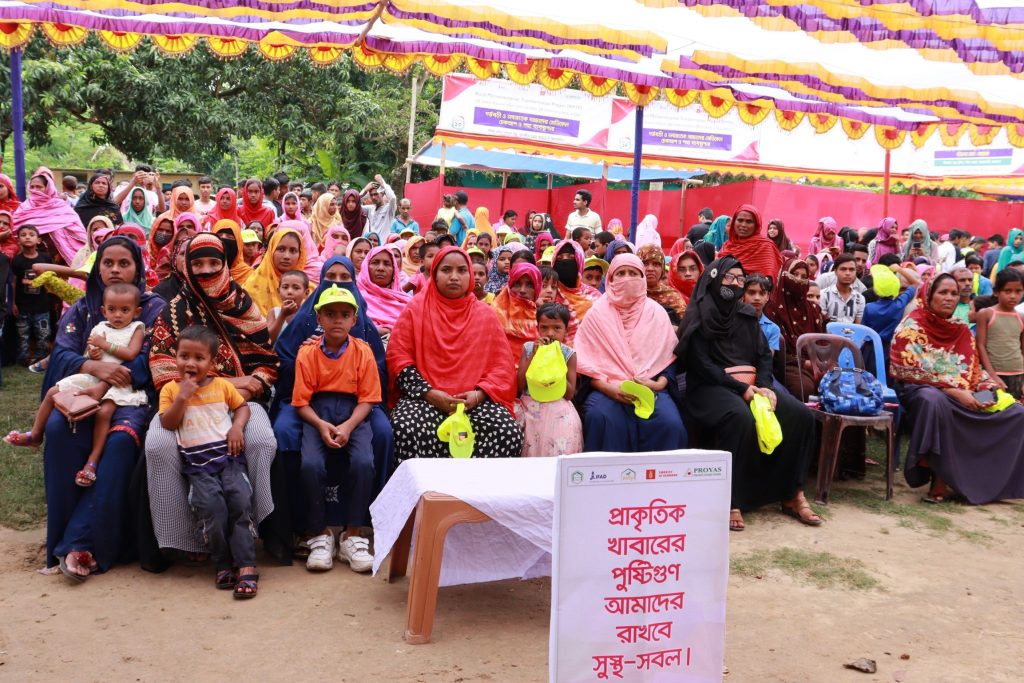
RMTP’s nutrition campaign serves as a commendable initiative, not only empowering and educating citizens but also reinforcing the significance of a well-balanced diet, hygiene practices, and safe food handling methods in enhancing the overall well-being of the community.
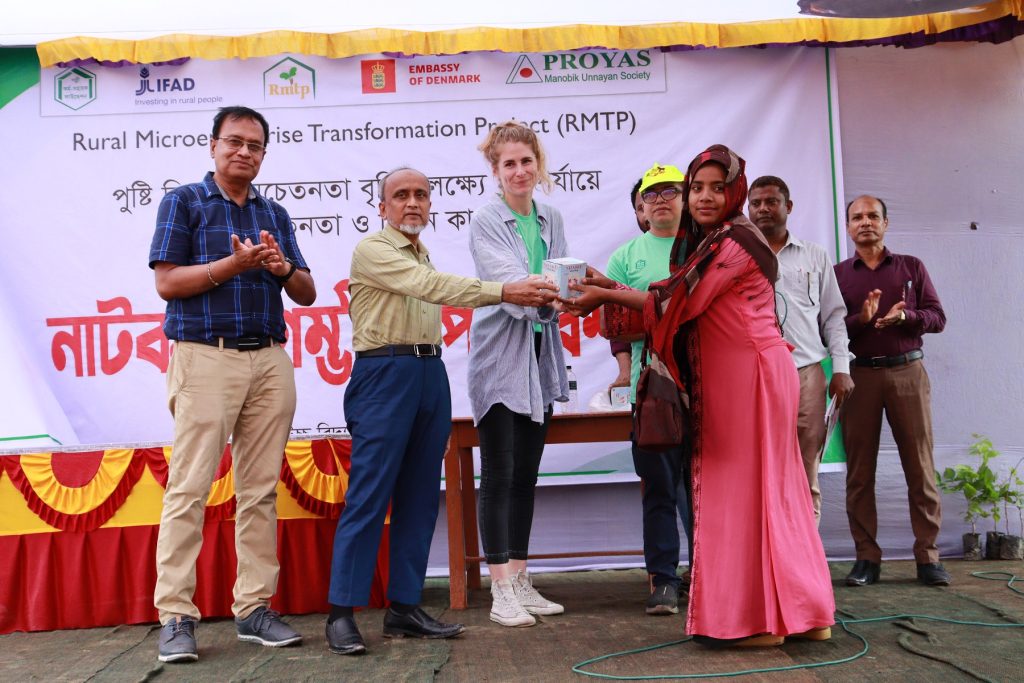
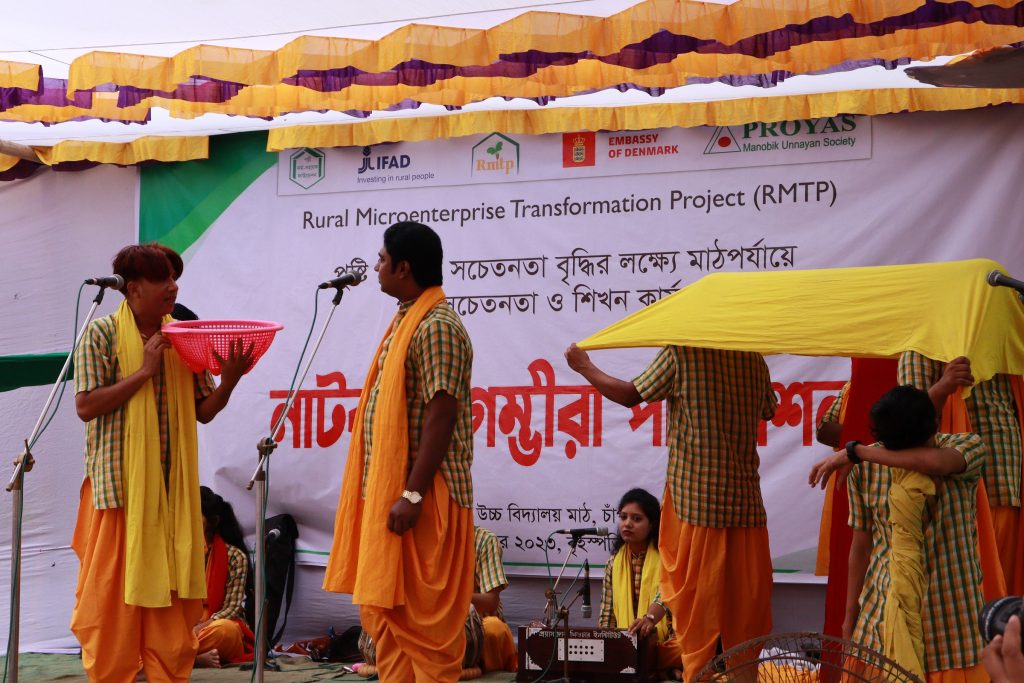
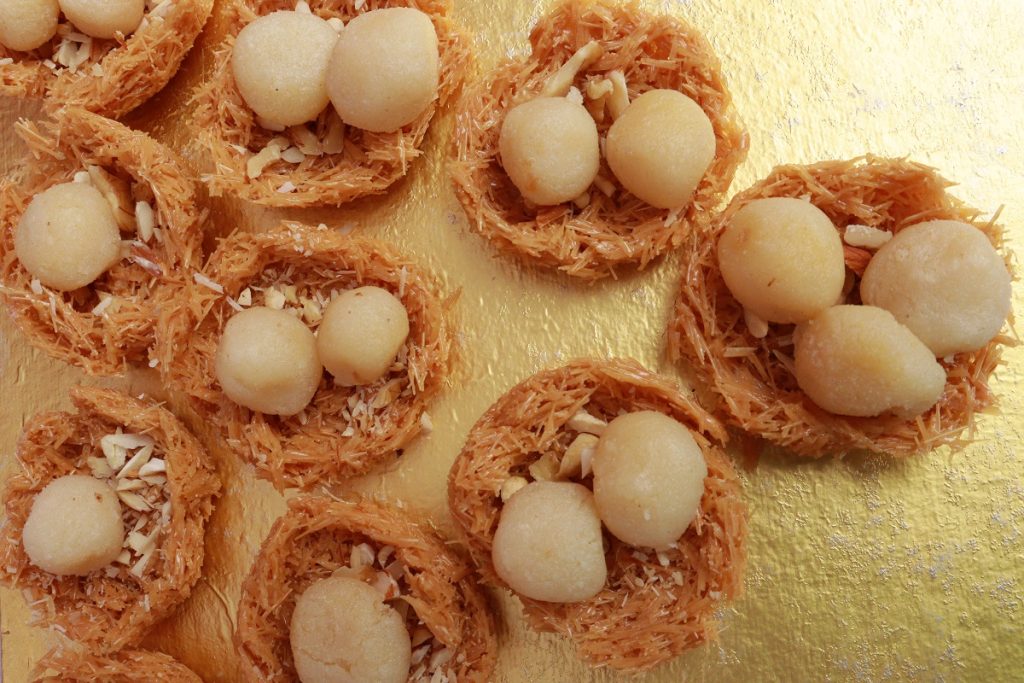
Ms Mariel Zemarmeal, Programme Officer at IFAD Bangladesh; Dr Akond Md. Rafiqul Islam, Project Coordinator of RMTP, PKSF; Ms Farhana Urmee, Communications Advisor of IFAD Bangladesh; the Executive Director of PROYAS; officers from the district civil surgeon’s office; officers from the district food safety authority; and PMU officials of RMTP also attended the event.
